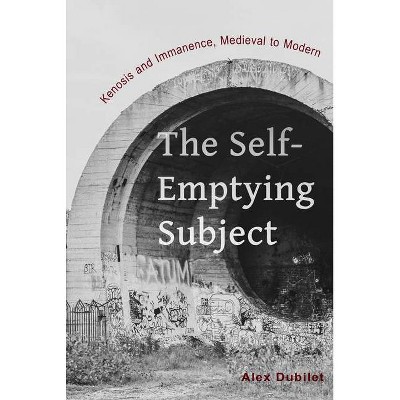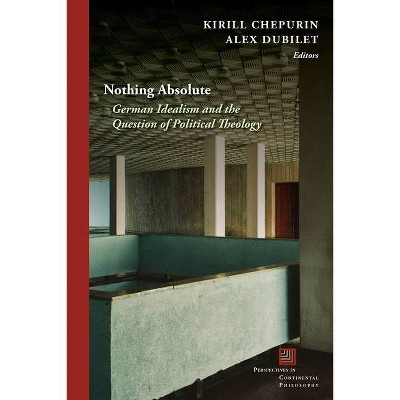The Self-Emptying Subject - by Alex Dubilet (Paperback)

Similar Products
Products of same category from the store
AllProduct info
<p/><br></br><p><b> About the Book </b></p></br></br><i>The Self-Emptying Subject</i> engages Christian mystical theology, modern philosophy, and contemporary theories of the subject to theorize an ethics of self-emptying, or <i>kenosis</i>, that reveals the immanence of a dispossessed life "without a why."<p/><br></br><p><b> Book Synopsis </b></p></br></br><p>Against the two dominant ethical paradigms of continental philosophy-Emmanuel Levinas's ethics of the other and Michel Foucault's ethics of self-cultivation--<i>The Self-Emptying Subject</i> theorizes an ethics of self-emptying, or kenosis, one that reveals the immanence of an impersonal and dispossessed life without a why. Rather than align immanence with the enclosures of the subject, Dubilet engages the history of Christian mystical theology, modern philosophy, and contemporary theories of the subject to rethink immanence as what precedes and exceeds the very difference between the (human) self and the (divine) other, between the subject and transcendence. By arguing that transcendence operates on life in secular as well as religious domains, the book challenges a dominant distribution of concepts within contemporary theoretical discourse, which associates transcendence exclusively with religion and theology and immanence exclusively with modern secularity and philosophy. <p/><i>The Self-Emptying Subject</i> argues that it is important to resist framing the relationship between medieval theology and modern philosophy as a transition from the affirmation of divine transcendence to the establishment of autonomous subjects. Through an engagement with Meister Eckhart, G. W. F. Hegel, and Georges Bataille, it uncovers a medieval theological discourse that rejects the primacy of pious subjects and the transcendence of God (Eckhart); retrieves a modern philosophical discourse that critiques the creation of self-standing subjects through a speculative rewriting of the concepts of Christian theology (Hegel); and explores a discursive site that demonstrates the subjecting effects of transcendence across theological and philosophical operations and archives (Bataille). Taken together, these interpretations suggest that if we suspend the antagonistic relationship between theological and philosophical discourses and decenter our periodizing assumptions and practices, we might encounter a yet unmapped theoretical fecundity of self-emptying that frees life from transcendent powers that incessantly subject it to their own ends.</p><p/><br></br><p><b> From the Back Cover </b></p></br></br><p>"<i>The Self-Emptying Subject </i>is a fantastically worthwhile book--lucid, timely, and important. Dubilet explores kenosis as a radical possibility for life, where we may find an immanent joy not dependent on a future redemption."--Karmen MacKendrick, Le Moyne College <p/>"In this important book, Dubilet recharges immanence via Deleuze and others to fashion a kenotic subject without transcendence. Based on cutting-edge scholarship, these ground-breaking interpretations of Eckhart, Hegel, and Bataille constitute a significant intervention into contemporary continental philosophy of religion and theology."--Clayton Crockett, University of Central Arkansas <p/>Against the two dominant ethical paradigms of continental philosophy-Emmanuel Levinas's ethics of the other and Michel Foucault's ethics of self-cultivation--<i>The Self-Emptying Subject</i> theorizes an ethics of self-emptying, or kenosis, one that reveals the immanence of an impersonal and dispossessed life without a why. Rather than align immanence with the enclosures of the subject, Dubilet engages the history of Christian mystical theology, modern philosophy, and contemporary theories of the subject to rethink immanence as what precedes and exceeds the very difference between the (human) self and the (divine) other, between the subject and transcendence. By arguing that transcendence operates on life in secular as well as religious domains, the book challenges a dominant distribution of concepts within contemporary theoretical discourse, which insists on associating transcendence exclusively with religion and theology and immanence exclusively with modern secularity and philosophy. <p/><i>The Self-Emptying Subject</i> argues that it is important to resist framing the relationship between medieval theology and modern philosophy as a transition from the affirmation of divine transcendence to the establishment of autonomous subjects. Tracing the discourses of self-emptying from Meister Eckhart through Hegel to Bataille, Dubilet suspends the antagonistic relationship between theological and philosophical discourses. In decentering our periodizing assumptions and practices, he shows how we might encounter a yet unmapped theoretical fecundity of self-emptying that frees life from transcendent powers that incessantly subject it to their own ends. <p/><b>Alex Dubilet</b> is Senior Lecturer in English and Political Science at Vanderbilt University. He is co-translator (with Jessie Hock) of François Laruelle's <i>General Theory of Victims</i> and <i>A Biography of Ordinary Man: On Authorities and Minorities</i>.</p><p/><br></br><p><b> Review Quotes </b></p></br></br><br><i>The Self-Emptying Subject </i>is lucid, timely, and important. Dubilet explores kenosis as a radical possibility for life--where we may find an immanent joy not dependent on a future redemption. Meticulous and original readings of Meister Eckhart, G. W. F. Hegel, and Georges Bataille ground the exploration. This is a fantastically worthwhile book for scholars and students of kenosis, subjectivity, divine immanence, or any of the historical figures that it explores.<b>---Karmen MacKendrick, <i>Le Moyne College</i></b><br><br>In this important book, Dubilet recharges immanence via Deleuze and others to fashion a kenotic subject without transcendence. Based on cutting-edge scholarship, these ground-breaking interpretations of Eckhart, Hegel, and Bataille constitute a significant intervention into contemporary continental philosophy of religion and theology.<b>---Clayton Crockett, <i>University of Central Arkansas</i></b><br><p/><br></br><p><b> About the Author </b></p></br></br><b>Alex Dubilet</b> is Senior Lecturer in the Departments of English and Political Science at Vanderbilt University. He is co-translator (with Jessie Hock) of François Laruelle's <i>General Theory of Victims</i> and <i>A Biography of Ordinary Man: On Authorities and Minorities</i>.
Price History
Cheapest price in the interval: 28.49 on October 27, 2021
Most expensive price in the interval: 28.49 on November 8, 2021
Price Archive shows prices from various stores, lets you see history and find the cheapest. There is no actual sale on the website. For all support, inquiry and suggestion messagescommunication@pricearchive.us



















